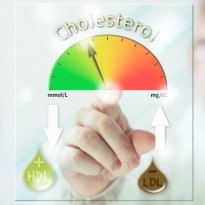High blood cholesterol remains one of the biggest health related concerns all over the world. Cholesterol stands for a kind of fat (lipid) in the blood that, after a point of time, starts building up around the arteries and blood vessels. This leads to a disruption in the proper circulation of blood which increases the risk of heart diseases. Not only this, there is another reason why one should maintain healthy cholesterol levels. A new study links high levels of cholesterol with a risk of developing breast cancer. "Our preliminary study suggests that women with high cholesterol in their blood may be at a greater risk of getting breast cancer," said Rahul Potluri, founder of the Algorithm for Comorbidities, Associations, Length of Stay and Mortality (ACALM) study.It raises the possibility of preventing breast cancer with statins, which lowers cholesterol, he added.
The researchers conducted a retrospective analysis of more than one million patients across Britain between 2000 and 2013. There were 664,159 women and of these, 22,938 had hyperlipidaemia and 9,312 had breast cancer. Some 530 women with hyperlipidaemia developed breast cancer."We found that women with high cholesterol had a significantly greater chance of developing breast cancer. This was an observational study so we can't conclude that high cholesterol causes breast cancer but the strength of this association warrants further investigation," Potluri said.The research was presented Friday at "Frontiers in CardioVascular Biology (FCVB) 2014" seminar in Barcelona, Spain.Inputs from IANS
The researchers conducted a retrospective analysis of more than one million patients across Britain between 2000 and 2013. There were 664,159 women and of these, 22,938 had hyperlipidaemia and 9,312 had breast cancer. Some 530 women with hyperlipidaemia developed breast cancer."We found that women with high cholesterol had a significantly greater chance of developing breast cancer. This was an observational study so we can't conclude that high cholesterol causes breast cancer but the strength of this association warrants further investigation," Potluri said.The research was presented Friday at "Frontiers in CardioVascular Biology (FCVB) 2014" seminar in Barcelona, Spain.Inputs from IANS
Advertisement









